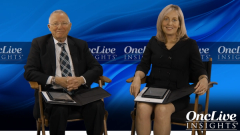
Emerging Therapies for Treatment of MDS
Expert oncologists discuss management strategies for patients with lower-risk MDS considering upcoming treatment options.
Episodes in this series

Transcript:
Hetty Carraway, MD: There are other novel therapies that are being evaluated and presented here at ASCO [American Society of Clinical Oncology annual meeting]. Do you have any thoughts that you’d like to bring forth for discussion today with regard to that?
Ralph Boccia, MD, FACP: I think the combinations and the … agents are exciting. That’s where the field seems to be moving right now. I’m anxious to actually hear the presentations, but we have opened the door and we are now ready to step through and meet more of those unmet needs.
Hetty Carraway, MD: Yeah. I would agree with that. You had mentioned earlier that in the management of your patients with MDS [myelodysplastic syndromes], you’re not always getting the mutational data on your patients. In light of some of the conversations that we were talking about with the COMMANDS study [NCT03682536] and the presence of ring sideroblasts or the presence of mutations like SF3B1, how important is it for your practice to get that mutational data. Will it impact your choice of upfront therapy, whether it’s [an] ESA [Erythropoiesis-stimulating agent] or luspatercept [Reblozyl], if luspatercept were approved in the upfront setting?
Ralph Boccia, MD, FACP: I’m not quite sure. But we have been getting myeloid NGS [next-generation sequencing] on our patients for the last 4-5 years. I think that everyone needs to be doing that. I can remember probably 10 or 15 years ago having a patient come in who was anemic and had a del(5q) [deletion 5q]. I talked to them about what a great prognosis they were going to have and put them on lenalidomide [Revlimid].
Within 6 months, the patient died of acute leukemia.
We didn’t have next-gen [generation] sequencing then, but I can bet then they had an EVT6 [deletion], or RUNX1 or an ANXA1, or TP53 [mutation], or something like that, that if we had known that we would have started the process of thinking about disease modification and transplants sooner. We would’ve been prepared as soon as we saw anything evolving.
Hetty Carraway, MD: With the IPSS-M [Molecular International Prognostic Scoring System], we get more information about how to pivot for our patients in ways that we wouldn’t have anticipated if we didn’t have the molecular information. I think the molecular information is a real important piece to the story. Even in patients that we see as second opinions. For some patients when we evaluate for ring sideroblasts, there can be a difference with regard to the bone marrow biopsy and who’s reading the bone marrow biopsy as to even if ring sideroblasts were reported on the marrow. So some of those pieces I think we’re going to be even more particular about as we look to the evaluation of all of our patients with MDS.
Ralph Boccia, MD, FACP: And now that we have drugs that work in that setting.
Transcript edited for clarity.





































